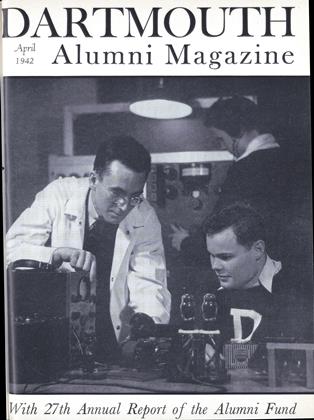SOME PEOPLE ARE PREDICTING that colleges and universities will find permanent values in some parts of the accelerated war program which they are adopting. But like the problem of "what kind of a peace will follow the war" the first efforts have been concentrated on speeding up and making adjustments to the new schedule rather than philosophizing about what it will be when the conflict is over. The colleges realize that the question of who wins the war is of maximum importance and their programs have been revised to meet the needs of the country just as quickly and completely as possible.
Institutional acceleration has been effected by colleges and universities in three different ways: the quarter system, the semester system with a summer school, and the three term or "three semester" plan. In all cases a practically continuous session is provided which permits completion of the usual eight semesters in three years or less. There have also been some provisions made for allowing students of exceptional ability to advance as rapidly as their competence will permit. Some colleges have even announced plans for admitting secondary school students before they graduate from secondary schools.
Some apprehension has been expressed about the effect of acceleration on lowering standards, injuries to the health of students and faculty, or the abandonment of sound educational principles. It is our opinion that these dangers are no more present in educational institutions than they are in business, industry, the professions, or the army or navy where speeding up has become the top consideration but where standards, health, and principles are receiving emphasis equal to, if not greater than, was true in peace times.
In this matter we can speak only for Dartmouth where a summer term of full-semester length ("three semester" plan) will begin May 25; where a summer school open to freshmen will begin July 8; where the program of instruction from now on for the duration will be continuous; and where students and faculty are united in seeking to achieve maximum academic work without sacrificing standards.
The acceleration accomplished by means of a third full semester each year will enable students now in College to be graduated as follows: class of 1943 in December, 1942; class of 1944 in August, 1943; and class of 1945 in April, 1944. Although for- mal Commencement exercises will probably be held only once a year, in May, the Bachelor of Arts degree will be awarded at the end of each of the three terms.
 View Full Issue
View Full Issue
More From This Issue
-
 Article
ArticleManager of College Finance
April 1942 By ARTHUR DEWING '25 -
 Article
ArticleAssociated Schools-Fund Contributors
April 1942 -
 Class Notes
Class Notes1924*
April 1942 By A. A. ADAMS JR. -
 Class Notes
Class Notes1926*
April 1942 By ROBERT E. CLEARY -
 Class Notes
Class Notes1937*
April 1942 By DONALD C. MCKINLAY -
 Class Notes
Class Notes1939*
April 1942 By RICHARD S. JACKSON
The Editor
-
 Article
Article"We Can't Take It"
November 1935 By The Editor -
 Article
ArticleThe Changing Season
December 1935 By The Editor -
 Article
ArticleAlumni in Service
October 1941 By The Editor -
 Article
ArticleNot So Dumb
March 1942 By The Editor -
 Article
ArticleHarry Ellinger
March 1942 By The Editor -
 Article
ArticleBad News for Our Readers
October 1943 By The Editor








